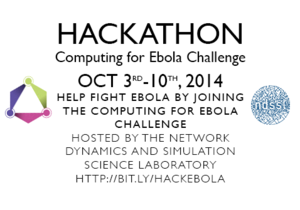Published 8 October 2014
Researchers at the Network Dynamics and Simulation Science Laboratory (NDSSL) have been using a combination of modeling techniques to predict the spread of the Ebola outbreak. As part of those efforts, the team created an adaptable set of global synthetic populations, allowing for rapid response as the situation continues to unfold. The synthetic populations and other informatics resources are now openly available to aid other researchers and citizen scientists. The NDSSL is hosting a Computing for Ebola Challenge from 3 October to 10 October 2014. The goal of the hackathon is to develop an application to combat the Ebola epidemic. All are welcome to join.

Challenge to combine social models to predict Ebola virus spread // Source: vt.edu
Researchers at the Network Dynamics and Simulation Science Laboratory (NDSSL) have been using a combination of modeling techniques to predict the spread of the Ebola outbreak. As part of those efforts, the team created an adaptable set of global synthetic populations, allowing for rapid response as the situation continues to unfold. The synthetic populations and other informatics resources are now openly available to aid other researchers and citizen scientists.
A Virginia Bioinformatics Institute (VBI) release reports that the NDSSL is hosting a Computing for Ebola Challenge from 3 October to 10 October 2014. The goal of the hackathon is to develop an application to combat the Ebola epidemic. All are welcome to join. People with a variety of skill sets are needed to build apps, enter data, design educational materials and more.
“We use team science and innovative approaches to answer challenging problems when a rapid response is needed,” said Stephen Eubank, deputy director of NDSSL. “The Computing for Ebola Challenge drives team science to a whole other level by finding ways to engage and empower the public to take on this growing epidemic together.”
NDSSL says that to aid participants and researchers worldwide, it is releasing several synthetic populations based on detailed microscopic simulation-based modeling and integration techniques. The detailed data includes population, locations, activities and contract graphs for Sierra Leone, Liberia, Guinea, and Nigeria.
It was evident early on that having quality data would be essential when combatting the challenging disease. A diverse group of researchers — faculty, staff and students, have come together to lend their expertise in situational awareness and decision support.
These efforts have culminated in an informatics resources page for Ebola epidemic response. The site is available to the public as a means of sharing useful information about the work being done at NDSSL to combat Ebola. Visitors can find open data sets, social media monitoring, Ebola modeling updates and other relevant information.
“Successful applications to complex socially and biologically coupled systems have repeatedly demonstrated the effectiveness of the NDSSL synthetic information systems approach,” said Christopher Barrett, the executive director of the Virginia Bioinformatics Institute. “Both the distribution of Ebola-related synthetic data and the Simfrastructure app challenge announced here speak once again to the novelty, usefulness and quality of the NDSSL R&D program.”
NDSSL anticipates hosting more resources over time, including analytical tools and other broad based resources. Lab-led projects from the Computing for Ebola Challenge will be openly available and incorporated into the informatics resources page.
“The hackathon and the informatics resource hub will allow citizen scientists, academics and students to play an active role in developing innovative analytic tools and apps that can be used for responding to the current outbreak,” said Madhav Marathe, director of NDSSL. “We expect that many of the data sets and tools will find a broader applicability over time by providing an information exchange resource.”
Researchers at NDSSL are developing innovative synthetic datasets as a result of long and sustained research and development efforts. The informatics resources and subsequent Computing for Ebola Challenge are part of a larger program mission of the NDSSL to create informatics tools to solve societal problems.
www.homelandsecuritynewswire.com
No comments:
Post a Comment